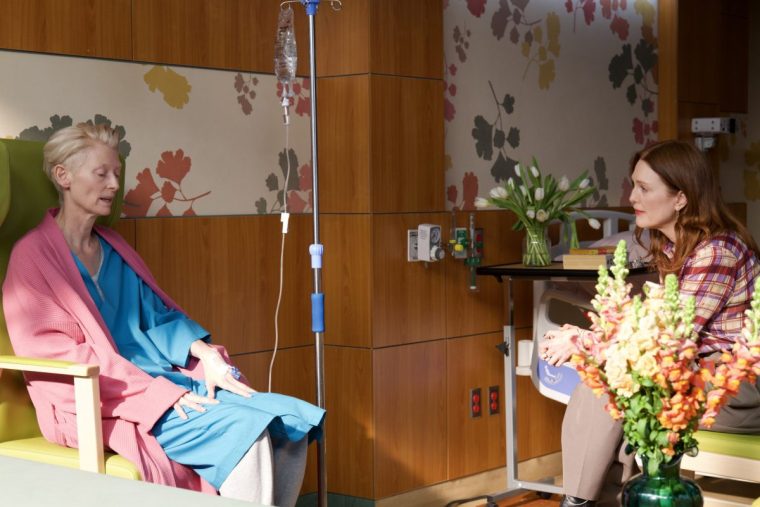The first 15 minutes of Pedro Almodóvar’s The Room Next Door, a black comedy that interrogates our awkward relationship with death, suffer from a stiltedness that doesn’t seem entirely intended. Writer Ingrid (Julianne Moore) is signing copies of her latest book (about her fear of death) in a New York bookshop when an old friend appears in the queue and informs her of their mutual friend Martha’s cancer. “It’s a bad one,” she blurts out, smiling robotically.
Ingrid then scurries off to hospital to see Martha (Tilda Swinton), where there is some horribly exposition-heavy dialogue. We learn swiftly of their past working together on a hip magazine in the 80s, Martha’s former career as a war reporter, and her tragic semi-estrangement from her daughter. This might, in typical Almodóvar style, be the most beautiful hospital room in the world, as Martha lies dying in sensational cerulean trousers surrounded by delphiniums and expensive wallpaper, but the chat feels off-puttingly sterile. Something lost in translation, perhaps? This is the Oscar-winning director and writer’s 23rd feature film (his Spanish hits include Volver and Talk to Her) but his first English-language one.
However, once it gets going, this stiltedness thankfully settles in to more of a calculated, sensuous strangeness that recalls the dreamlike atmosphere of David Lynch’s Mulholland Drive – and this feels absolutely in keeping with the film’s anxiety about its subject.

Almodóvar, like his characters, appears both frightened of life’s fragility and entranced by it, coming up close to difficult conversations and then backing off suddenly, veering between tenderness and uneasy comedy. The women renew their old friendship with an easy and enthusiastic intimacy, and Martha asks Ingrid if she will accompany her to upstate New York where she wants to take a euthanasia pill rather than return to Manhattan for new treatment. The cancer is now terminal.
Ingrid reluctantly agrees to go, and half of the film takes place there, in a glass-panelled, modernist house, where the women lie on sun-dappled loungers and listen to birds chirping in the pine trees, quoting James Joyce and watching Charlie Chaplin.
There are brief, funny interludes with Ingrid’s trainer at the gym and the climate change pessimist Damian (John Turturro), who is also a previous lover of both women (“It was like having sex with a terrorist,” he tells Ingrid, of his time with Martha). But otherwise the film relies almost entirely on Swinton and Moore, both of whom give career-best performances. This is particularly true of Swinton, on whose face Almodóvar homes in relentlessly as it twitches in turn from acceptance (verging on euphoria) to desperation, as she gradually loses her ability to eat, to read, to focus. She is filled with regret, too, at her neglectful approach to motherhood, which contrasts sharply with her joyous flashbacks to Bosnia and Iraq. Swinton looks practically cadaverous at points, and the close-ups sometimes feel like a violation, a feeling of encroachment we also observe in Ingrid, who really doesn’t want to be there, yet somehow is.
The film, perhaps a spiritual sequel to Almodóvar’s Pain and Glory (2019), also about elderly decline, is timely when it comes to the current euthanasia debate in Britain (“I feel like a criminal,” bemoans Martha as she preps for death in expensive polo necks). The patience and candid discomfort with which Almodóvar approaches it all feels fresh, the women’s relationship increasingly moving. When the end comes, it’s neither conclusive nor unrealistically cheerful, but it is somehow bearable.
‘The Room Next Door’ is in cinemas from 25 October


